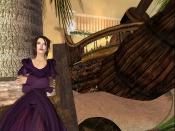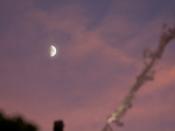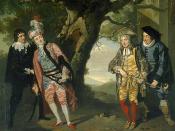Shakespeare's play, Twelfth Night, is all about playing jokes on people, sometimes deliberately confusing them, and just basically having a happy time. Most the characters follow the tradition of Twelfth Night, however some do not. In Act 2 Scene 4, the tradition is not comprehensible, however, in Act 3 Scene 1, it is, as both Feste and Viola/Cesario are making jokes with one another. The selected paragraphs are where people get mislead a lot due to playing on words, double-meanings, or misunderstandings.
Act 2 Scene 4 is mostly written in poetry- which means that the scene is not funny, as it would be if it was written in prose, but quite serious and sincere. It starts off quite formal, but after Feste breaks the ice a bit with a song, Orsino and Viola/Cesario talk about whom they love. For Orsino this is not a big thing, as he talks of Olivia quite a lot, but this is the first Orsino has heard of the person Viola/Cesario loves.
This is dramatic irony as the audience all know that she is in fact talking about Orsino. It is also rather comical when Orsino is mislead to keep asking questions about the person that Viola/Cesario loves. In this scene, Viola (dressed as Cesario) keeps trying to find out if Orsino could ever love anyone else if they loved him, "Say that some lady, and perhaps there is, hath for your love..." By this she means herself, which causes dramatic irony for the audience. Also, by suggesting, that maybe there could be someone that loves Orsino as much as he loves Olivia, she knows full well there is someone, and is perhaps anticipating his reaction to this thought. Later on in the scene, when talking about a daughter that her father has,



Twelfth Night
Thanks for a good essay on how language is used in Act 2, Scene 4 and Act 3, Scene 1 to mislead characters in Twelfth Night. You have demonstrated well with apt textual examples how Shakespeare uses language skills such as puns and double meanings to deceive some of his characters in his well loved comedy. As you point out, this was in keeping with the customary playing of tricks of the season featured in the play's title. Your report was perceptive and to the point. Fine effort! The content of your paper appears to be the same as that for your other essay titled "12th Night- How Viola Reveals Her True feeling To People Shown Around Her In Act 2 Scene 4 And Act 3 Scene 1."
5 out of 5 people found this comment useful.